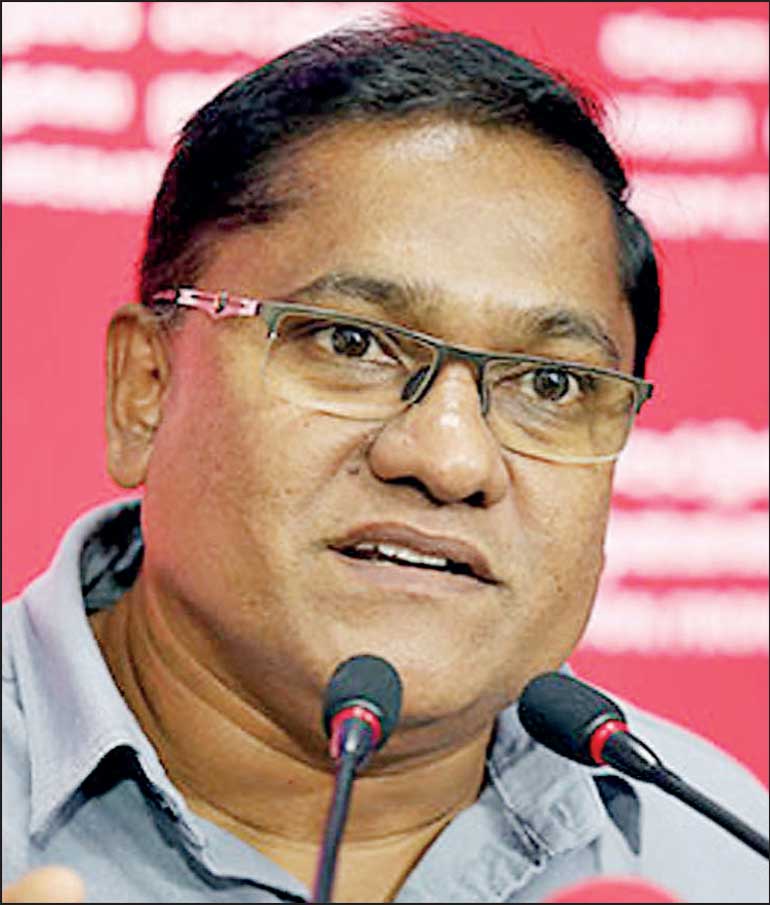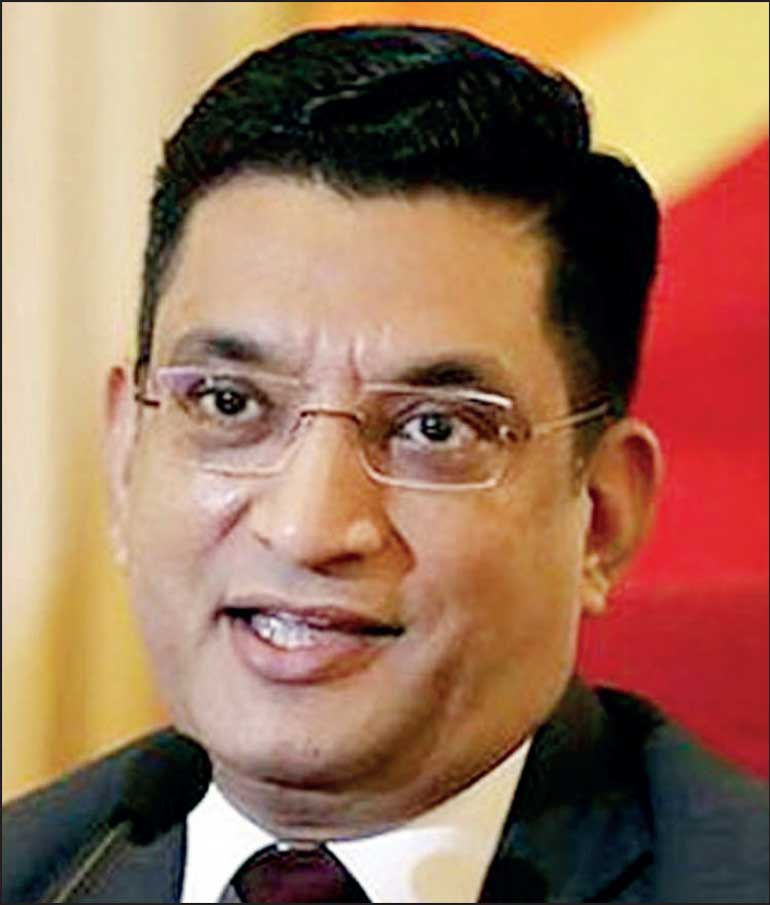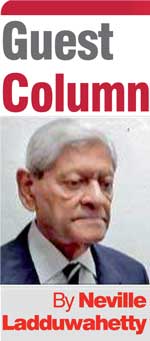Sunday Feb 15, 2026
Sunday Feb 15, 2026
Wednesday, 23 October 2024 00:26 - - {{hitsCtrl.values.hits}}

Foreign Minister Vijitha Herath

Former Foreign Minister Ali Sabry
 The front page of the Daily FT (9 Oct. 2024) carries a front page report titled “Sri Lanka reaffirms neutral diplomacy” (https://www.ft.lk/front-page/Sri-Lanka-reaffirms-neutral-diplomacy/44-767745). The report states: “The Cabinet Spokesman and Foreign Minister Vijitha Herath yesterday had assured that Sri Lanka maintains balanced diplomatic relations with all countries, reaffirming its policy of friends of all and enemy of none.” Quoting the Foreign Minister, the report states: “There is no favouritism. We do not consider any country to be special. Whether it is big or small, Sri Lanka maintains diplomatic relations with all countries – China, India, the US, Russia, Cuba, or Vietnam. We have no bias in our approach, he said…”
The front page of the Daily FT (9 Oct. 2024) carries a front page report titled “Sri Lanka reaffirms neutral diplomacy” (https://www.ft.lk/front-page/Sri-Lanka-reaffirms-neutral-diplomacy/44-767745). The report states: “The Cabinet Spokesman and Foreign Minister Vijitha Herath yesterday had assured that Sri Lanka maintains balanced diplomatic relations with all countries, reaffirming its policy of friends of all and enemy of none.” Quoting the Foreign Minister, the report states: “There is no favouritism. We do not consider any country to be special. Whether it is big or small, Sri Lanka maintains diplomatic relations with all countries – China, India, the US, Russia, Cuba, or Vietnam. We have no bias in our approach, he said…”
The above comment by Foreign Minister Vijitha Herath is a carry-over of the Policy of Neutrality that had existed prior to the Presidency of Ranil Wickremesinghe. Reaffirming that policy, President Wickremesinghe had stated: “We are a neutral country, but we also emphasise the fact that we cannot allow Sri Lanka to be used as a base for any threats against India” during an interview with France24. This Policy was “elaborated” upon by Prime Minister Gunawardena when he spelt out what was stated by President Wickremesinghe” (Daily News, 30 June 2023). However, if as claimed, Sri Lanka is a “neutral country”, it is an internationally accepted obligation that the territory of a neutral State is not allowed to be a threat to India or any other country. Therefore, repeating such assurances specifically to India is superfluous; a mistake the new Government should not make.
A fact that should not be overlooked is that the genesis of the Foreign Policy of Neutrality goes back to the previous President, Gotabaya Rajapaksa, when he publicly announced first during his acceptance speech to the nation on being elected President at Anuradhapura and later to Parliament on 3 January 2020 when he stated: “We follow a neutral foreign policy.” (Perhaps the adoption of neutrality as his foreign policy was influenced by an article published nearly one year before he was elected President (“Independence: Its meaning and a direction for the future” The Island, 14 Feb. 2019).
Therefore, a Foreign Policy of Neutrality is here to stay; a fact accepted and reflected in the statement made by the Foreign Minister of the new Government, Vijitha Herath. Under the circumstances, to comment that Sri Lanka does not have a defined foreign policy by some in the new Government or that the policy is one of non-alignment is not correct. Furthermore, to state that the foreign policy of Sri Lanka should be balanced in its relations with other States, is to ignore and disregard a key tenet of neutrality, which is impartiality; a fact emphasised by FM Vijitha Herath “There is no favouritism”.
Non-Aligned and/or Balanced
 There are private and Government sponsored reputed think tanks and individuals who vigorously defend the relevance of a Non-Aligned Foreign Policy, notwithstanding the fact that its relevance has ceased because circumstances and global dynamics have changed. The concept of being Non-Aligned had its relevance in a bi-polar world order because circumstances permitted individual states not to align itself with either block and stay neutral. It was India’s Foreign Minister, Krishna Menon who initially fiercely advocated neutrality as India’s Foreign Policy. Later it was India under Menon’s astute and brilliant leadership backed by its political leaders such as Nehru, that India campaigned for collective action in the form of a coalition of newly independent Non-Aligned States and named it the Non-Alignment Movement (NAM) (Mathew, The Island, 9 Oct. 2024). Thus, unlike Neutrality that is protected by internationally accepted norms, the Policy of Non-Alignment is not a Policy that could stand on its own merits, other than to act independently managing competing self-interests.
There are private and Government sponsored reputed think tanks and individuals who vigorously defend the relevance of a Non-Aligned Foreign Policy, notwithstanding the fact that its relevance has ceased because circumstances and global dynamics have changed. The concept of being Non-Aligned had its relevance in a bi-polar world order because circumstances permitted individual states not to align itself with either block and stay neutral. It was India’s Foreign Minister, Krishna Menon who initially fiercely advocated neutrality as India’s Foreign Policy. Later it was India under Menon’s astute and brilliant leadership backed by its political leaders such as Nehru, that India campaigned for collective action in the form of a coalition of newly independent Non-Aligned States and named it the Non-Alignment Movement (NAM) (Mathew, The Island, 9 Oct. 2024). Thus, unlike Neutrality that is protected by internationally accepted norms, the Policy of Non-Alignment is not a Policy that could stand on its own merits, other than to act independently managing competing self-interests.
Even during NAMs’ heyday, Sri Lanka did not support NAMs’ Resolution on the Falklands issue. Instead it supported UK for reasons of self-interest. Therefore, in the current context of a multi-polar world order in which individual States have become centres of power and some have formed themselves into regional alliances, it is likely that principles of NAM and the solidarity that prevailed then would be overlooked in preference for self-interest of each State. Under the new circumstances, it would be redundant for a State that claims to be Neutral to also claim that it is Non-Aligned because impartiality is one of its pillars. The reason for claiming both is perhaps because Neutrality is often misunderstood to mean that it is associated only with conflicts while Non-Aligned covers a broader spectrum.
In the prevailing context, Non-Alignment as a Policy does not serve a meaningful purpose because individual States such as Sri Lanka that are Neutral are already free to pursue its own interests unhampered without aligning with any other State or States. Furthermore, that freedom is lost if States such as Sri Lanka aligns or bandwagons with any other State or States. Therefore, to state that Sri Lanka is both Neutral and Non-Aligned is redundant. On the other hand, it has to be granted that a coalition of Neutral States has relevance only when common interests of several Neutral States are involved.
The alternative policy advocated by some Foreign Policy experts is for Sri Lanka to exercise balance in its relations with other States. The theory of Balancing is supposed to mean the ability for States to equip itself individually or collectively to overcome external threats. Balancing under such circumstances has no relevance to Sri Lanka because it should not equip itself to develop capabilities either individually or collectively to meet international threats. Considering its size and resources, Sri Lanka’s best defence is reliance on internationally recognised laws of neutral states.
On the other hand, if Sri Lanka entertains the interests of States in a manner that reflects partiality or “favouritism” towards one State over another, it would not only run counter to concepts of Neutrality but also seriously undermine its credibility. For instance, balance in the context of entertaining projects that were not initiated by Sri Lanka such as the Wind Farm Project by the Adani Group and the Light Rail Project of Japan means catering to the interests of the other against that of Sri Lanka. Under the circumstances, competing interests are not in balance. For it to be balanced, the interests of all concerned parties should be considered the determining factor.
Neutrality in operation
Those unaware of the full scope and dynamics of the foreign policy of neutrality perceive it as being too weak and lacking in substance to serve the interests of Sri Lanka. In contrast, ardent advocates of non-alignment do not realise that its concepts are a collection of principles formulated and adopted only by a group and for the group of like-minded States to meet perceived challenges in context of a bi-polar world. In the absence of such a world order the principles formulated have lost relevance.
The internationally recognised ICRC Publication on Neutrality states: “The sources of the international law of neutrality are customary international law and, for certain questions, international treaties, in particular the Paris Declaration of 1856, the 1907 Hague Convention No. V respecting the Rights and Duties of Neutral Powers and Persons in Case of War on Land, the 1907 Hague Convention No. XIII concerning the Rights and Duties of Neutral Powers in Naval War, the four 1949 Geneva Conventions and Additional Protocol I of 1977
(June 2022).
A few key issues addressed in this publication are: “The principle of inviolability of a neutral state” and “The duties of neutral states”.
In reaffirming the concept of Neutrality, Foreign Minister Vijitha Herath stated that the Policy of Neutrality would operate in practice in the following manner: “There is no favouritism. We do not consider any country to be special. Whether it is big or small, Sri Lanka maintains diplomatic relations with all countries – China, India, the US, Russia, Cuba or Vietnam. We have no bias in our approach” (The Daily FT, 9 Oct. 2024).
Essential features of Neutrality, such as inviolability of territory and to be free of the hegemony of power blocks were conveyed by former Foreign Minister Ali Sabry at a forum in Singapore when he stated: “We have always been clear that we are not interested in being an ally of any of these camps. We will be an independent country and work with everyone, but there are conditions. Our land and sea will not be used to threaten anyone else’s security concerns. We will not allow military bases to be built here. We will not be a pawn in their game. We do not want geopolitical games playing out in our neighbourhood, and affecting us. We are very interested in de-escalating tensions. What we could do is have strategic autonomy, negotiate with everyone as sovereign equals, strategically use competition to our advantage” (The Daily Morning, 17 July, 2024).
Conclusion
It is indeed surprising that only the Daily FT reported the comments made by Foreign Minister Vijitha Herath following a press briefing in which he outlined his take on Foreign Policy. In essence, it was to continue with the Policy of Neutrality adopted by two former Presidents as being relevant in the context of a multi-polar world with its inherent geopolitical rivalries. The fact that the decision of this Government to continue with the Foreign Policy of Neutrality was not made public when the FM addressed the Foreign Envoys nor was it given publicity in the print media could have adverse effects on Foreign Relations with other States.
Sri Lanka’s location as the gateway to the Indo-Pacific is increasingly becoming a critical enough factor for major powers to compete for influence and/or “presence” as part of their rivalry in the geopolitical equation. Consequently, every opportunity would be explored to weaken Sri Lanka’s resolve to stay neutral and exercise its autonomy over what matters most to Sri Lanka and its people. Therefore, Sri Lanka has to be mindful of the proverbial Greeks bearing “gifts” to promote connectivity in the form of projects and exploitation and exploration of resources in land and sea at least until Sri Lanka is free of debt, assured of food security and
eliminates poverty.